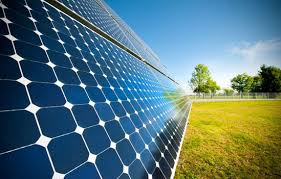
Power is an issue for all IoT supplications, but it doesn’t have to be with a huge thermonuclear generator just a few million miles away. I’m talking about the sun, of course. Getting energy from solar is ideal for IoT, since it’s easy to store, never runs out and can be implanted for an ever-decreasing cost to OEMs.
Kyocera is deploying such solar panels right now, tested specifically for long-term deployment in marine and coastal areas. The company is calling it the Ocean Internet of Things remote data monitoring platform and it’s off the coast of Huntington Beach, California. The new NOMAD sea buoy that is hosting the platform was developed by eMarine Systems for the 100-acre Catalina Sea Ranch and is designed to monitor a specific area in the ocean. The buoy is loaded with IoT sensors that transmit a variety of marine data in real-time to the wireless cloud, providing government agencies, the scientific community and research institutions a web-based analysis of the ocean.
“We selected Kyocera’s solar panels because they’re known for long-term reliability and quality,” said Bob Everhard, Sales Manager, eMarine Systems. “Knowing the panels have proven to withstand even the harshest coastal conditions ensures this innovative marine IoT solution will provide uninterrupted transmission of compelling data from the sea without costly and time-consuming maintenance issues.”
The buoy is an aluminum boat 10 feet wide and 20 feet long with equipment and batteries below deck. Four Kyocera 145W solar panels and a vertical axis wind turbine (VAWT) are supported by solar charge controllers and a battery monitor, which network together to provide power for the buoy’s remote monitoring capability. A Sea-Bird MicroCAT sensor on the buoy monitors water temperature, salinity, dissolved oxygen, phytoplankton density and sensor depth. Real-time cameras mounted to the mast provide security for the aquaculture ranch, and the buoy’s internal battery voltage and processor temperature are remotely monitored to help ensure optimal performance. In the future, the buoy will measure pH levels and pings from acoustic tags placed on marine mammals by researchers. It will also feature additional above- and below-water live camera feeds.
“Kyocera has more than 40 years of expertise producing PV solar panels that are widely known for durability and reliability, features that are also present in our ruggedized smartphones and long-life office document equipment,” said Cecilia Aguillon, director, market development, Solar Energy Group, Kyocera International. “Our solar modules are made to withstand harsh conditions in both aquaculture and agriculture environments, to help bring innovative solutions like the NOMAD buoy to life.”
The future is looking bright.
This article was originally published on www.iotevolutionworld.com and can be viewed in full here
 (0)
(0) (0)
(0)Archive
- October 2024(44)
- September 2024(94)
- August 2024(100)
- July 2024(99)
- June 2024(126)
- May 2024(155)
- April 2024(123)
- March 2024(112)
- February 2024(109)
- January 2024(95)
- December 2023(56)
- November 2023(86)
- October 2023(97)
- September 2023(89)
- August 2023(101)
- July 2023(104)
- June 2023(113)
- May 2023(103)
- April 2023(93)
- March 2023(129)
- February 2023(77)
- January 2023(91)
- December 2022(90)
- November 2022(125)
- October 2022(117)
- September 2022(137)
- August 2022(119)
- July 2022(99)
- June 2022(128)
- May 2022(112)
- April 2022(108)
- March 2022(121)
- February 2022(93)
- January 2022(110)
- December 2021(92)
- November 2021(107)
- October 2021(101)
- September 2021(81)
- August 2021(74)
- July 2021(78)
- June 2021(92)
- May 2021(67)
- April 2021(79)
- March 2021(79)
- February 2021(58)
- January 2021(55)
- December 2020(56)
- November 2020(59)
- October 2020(78)
- September 2020(72)
- August 2020(64)
- July 2020(71)
- June 2020(74)
- May 2020(50)
- April 2020(71)
- March 2020(71)
- February 2020(58)
- January 2020(62)
- December 2019(57)
- November 2019(64)
- October 2019(25)
- September 2019(24)
- August 2019(14)
- July 2019(23)
- June 2019(54)
- May 2019(82)
- April 2019(76)
- March 2019(71)
- February 2019(67)
- January 2019(75)
- December 2018(44)
- November 2018(47)
- October 2018(74)
- September 2018(54)
- August 2018(61)
- July 2018(72)
- June 2018(62)
- May 2018(62)
- April 2018(73)
- March 2018(76)
- February 2018(8)
- January 2018(7)
- December 2017(6)
- November 2017(8)
- October 2017(3)
- September 2017(4)
- August 2017(4)
- July 2017(2)
- June 2017(5)
- May 2017(6)
- April 2017(11)
- March 2017(8)
- February 2017(16)
- January 2017(10)
- December 2016(12)
- November 2016(20)
- October 2016(7)
- September 2016(102)
- August 2016(168)
- July 2016(141)
- June 2016(149)
- May 2016(117)
- April 2016(59)
- March 2016(85)
- February 2016(153)
- December 2015(150)
